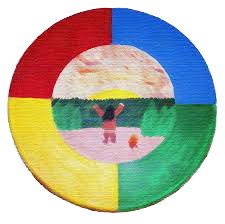Oral tradition and storytelling
Helen McPhaden and I were kicking around the idea of story telling the other day. At some level, the pieces I have contributed to for Stardale have all been based on writings the girls share with me. I have asked them, over the years, to share feelings on some very difficult subjects: suicide, drug use and abuse, missing and murdered indigenous women.
What makes our work, first for stage and now for film, so powerful is that the girls’ voices come through, loud and clear. It is quite possible that some people who see a film like The Road (theroadfilm.ca) have never even hear an aboriginal person speak, let alone a young girl. The good news is that it seems to leave our audiences wanting more and that’s exactly what we are working on this summer, a new film, new voices and different thoughts, this year on the subject of racism.
Is it story telling, though? Not exactly, in its purest sense. We ask the girls to share their thoughts on a given subject, which is different than asking them to tell their personal story, or even a story that is larger than their own experience. Story telling in its purest sense is an art form that has been practiced since the dawn of time. In the history of humanity, going back probably 200,000 years, writing and reading are relatively recent endeavours. For millennia, humans relied on the oral tradition for their very survival.
It’s thought that the wisdom of the people was entrusted to select people to share from one generation to the next. This could be very practical information, such as which plants are safe to eat and which ones to stay away from. But It could also be spiritual, about beliefs and values and codes of conduct. In this regard the story teller held a very important position in the community.
One of the ongoing disasters of the residential school system in Canada, it seems to me, is that the chain of the oral tradition was broken. It was forbidden for the children in the system to speak in their language or retain their traditional faith. Their gods were replaced with other gods, their myths were basically erased and their way forward was destroyed on account of this disconnect with their traditions.
But it’s not gone entirely. There are still keepers of the flame of the many first nations cultures. They are known generally as elders. Their voices are firm but soft. They have to compete with the internet and You Tube and Facebook and Spotify and television and all the rest of it. How to be heard amongst all this noisy confusion and distraction is the challenge, and it is a critical one.
With our girls at Stardale, who are mostly young, urban aboriginal girls, in some cases they have never heard the stories of the old ways. Their disconnect with their past is almost complete. They are left with the reality of being native, but with none of the historical wisdom. When they face discrimination, it is especially hurtful because they are being excluded from the only world they have ever known. They have nothing to fall back on and it leaves them in a very vulnerable position.
From some of their writing I have read and will use for our 2021 production, some of them experienced racism as early as preschool.
So, when Helen brought up story telling the other day, I thought, Oh yes, these girls need to hear some stories. In a sense, they need to know and understand what they have lost if they ever hope to get it back.
This was addressed this year in a few ways. First, the increased presence of Stardale’s elder Wanda First Rider. Such a quiet yet forceful and eloquent woman, believe me when she speaks everyone listens to each and every syllable. The second was in a drum making workshop led by Chantal Chagnon in which the girls were introduced to the traditional importance of the drum in indigenous cultures. Now they all have their own drum which they made themselves. It’s a beginning.
They say we are no more or less than our own story that gets written on us each day of our lives. Through rekindling the importance of the oral tradition in the girls I hope their stories will become richer and deeper as they travel further along the road.

